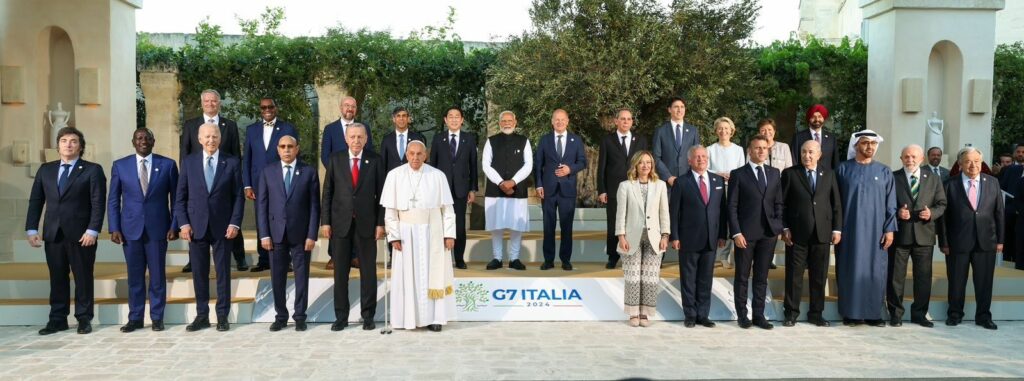
- During the G7 Summit in Italy, PM Narendra Modi engaged in one-on-one discussions with global leaders, including French President Emmanuel Macron, UK Prime Minister Rishi Sunak, and Ukrainian President Volodymyr Zelenskyy, focusing on strengthening strategic partnerships and addressing global issues.
- Modi emphasized a human-centric approach to technology, citing India’s success in using digital technology for public services and its ‘AI for All’ mission.
- Modi emphasized a human-centric approach to technology, outlined India’s energy transition goals aimed at achieving NET ZERO by 2070, and urged global participation in India’s environmental campaign “Plant4Mother”.
India has been invited as an Outreach Country at the G7 Summit in Italy this year. Prime Minister Modi engaged in one-on-one discussions with global leaders such as French President Emmanuel Macron, UK Prime Minister Rishi Sunak, and Ukrainian President Volodymyr Zelenskyy during the G7 Summit in Italy. During the summit, PM Narendra Modi met with his Italian counterpart, Giorgia Meloni and engaged in one-on-one discussions on various issues concerning the two countries. He also engaged in one-on-one discussions with other G7 heads of state such as US President Joe Biden. US National Security Adviser Jake Sullivan has verified that Biden is anticipating a meeting with PM Modi in Italy, where the two leaders will have a chance to interact.
While Macron and Modi discussed ways to strengthen further the strategic partnership, including in areas of defence, nuclear, and space, Zelenskyy briefed Modi on various aspects of the Russia-Ukraine conflict. His brief meeting with Sunak was also focused on strengthening bilateral relations. Modi highlighted the significance of Georgia Meloni’s two trips to India in the previous year, which played a crucial role in enhancing the progress and substance of our mutual priorities. Italy holds the position of being India’s fourth largest economic collaborator within the European Union, with the current bilateral trade volume reaching $15 billion, as reported by New Delhi.
PM Modi met his Japanese counterpart PM Kishida on the sidelines of the G7 Summit. Both expressed that strong ties between India and Japan are important for a peaceful, secure and prosperous Indo-Pacific. The two leaders resolved to work together in defence, technology, semiconductors, clean energy and digital technology.
Prime Minister Narendra Modi addressed the G7 Summit in Apulia, Italy, focusing on AI, energy, and concerns of the Global South, including Africa. He highlighted his satisfaction in attending the summit after his re-election in the world’s largest democratic exercise. Modi emphasized a human-centric approach to technology, citing India’s success in using digital technology for public services and its “AI for All” mission. He outlined India’s energy transition goals aimed at achieving NET ZERO by 2070 and urged global participation in India’s environmental campaign “Plant4Mother”. He also stressed prioritizing the concerns of the Global South, noting India’s role in the African Union’s inclusion in the G20.
What Is the G7 Summit?
Until 2014, the group was known as G8, but after Russia was expelled in 2014 following its annexation of Crimea, the group came to be known as G7. The G7, or the Group of Seven, is an intergovernmental organization that comprises the world’s largest and most advanced economies, namely Canada, France, Germany, Italy, Japan, the United Kingdom, and the United States. In addition, the European Union actively participates in G7 meetings. This group was established to foster economic collaboration and policy coordination among these influential economies, especially in response to the economic challenges faced during the 1970s, such as the 1973 oil crisis and subsequent recession.
In 1975, the first G7 Summit took place in Rambouillet, France, upon the request of the French President Valéry Giscard d’Estaing and the German Chancellor Helmut Schmidt. They aimed to encourage informal and adaptable dialogues among world leaders regarding global economic matters. As time passed, the G7’s agenda broadened to encompass a wider array of global concerns, such as international security, climate change, trade, and development.
The G7 Summits have become regular occurrences where heads of state, finance ministers, and central bank governors convene to deliberate and synchronize policies. The G7 has been instrumental in tackling critical worldwide issues like debt relief for developing nations, nuclear non-proliferation, and managing global financial downturns. Despite being labelled as an elitist group of affluent countries, the G7 remains an essential platform for fostering international collaboration and discussions among the most powerful global economies.
